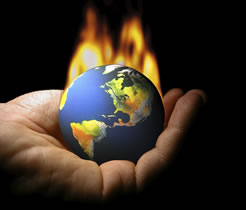The worst effect of manmade climate-change has begun and is unstoppable. The world is on the cusp of a 'tipping-point into dangerous climate change, according to new data gathered by scientists measuring methane leaking from the Arctic permafrost and a report presented to the United Nations on Tuesday.
'The permafrost carbon feedback is irreversible on human time scales,' says the report, Policy Implications of Warming Permafrost. 'Overall, these observations indicate that large-scale thawing of permafrost may already have started.'
While countries the size of Australia tally up their greenhouse emissions in hundreds of millions of tonnes, the Arctic's stores are measured in tens of billions.
'Lift your eyes to the heavens, look at the earth beneath: the heavens grow murky as smoke; the earth wears into tatters like a garment, and those who live on it die like maggots; but the deliverance of the LORD God is everlasting and his saving power shall never wane.' Isaiah 51:6 (New English Bible).
Full story here.

